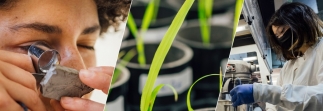
Priya Kalluri, ’16, doing research on several generations of Frankenstein adaptations, using MIT Libraries’ resources.
By MIT Libraries’ student blogger, Pri Tembhekar
Hello everyone! It is research season! Well at least many of us have design projects, theses, or final reports that require significant research. This week I’ll be highlighting some of the Libraries’ resources for research. You probably already know about finding print resources, such as books owned by the MIT Libraries. While this is a good first step, there are many additional sources of information that can add depth and breadth to your findings.
Subject matter experts are part of the Libraries’ staff and have specialized knowledge about subjects ranging from accounting to women’s and gender studies. These experts can provide research consultations for courses, theses, and other in-depth research. These consultations can be very valuable if you come prepared, and with a project that isn’t due in the next two hours. In case you are facing an impending deadline, these subject matter experts have kindly put together subject matter guides. For an example of how these can be used, take the one on energy. The experts have provided a list of easily accessible databases and journals along with short descriptions of their contents. This enables students to produce higher quality research than Google alone can facilitate. The guides are also a direct way to utilize MIT-only resources without much research into which resources are available and relevant. In short, some of the leg work has been done for you! For a particularly fun research guide, check out the one on designing and making stuff.
Along the same lines as the research guides, the Libraries provide class guides. Certain classes require substantial outside material and/or research from students. The professors can work with librarians to put together class guides especially usefully for that class. If your research is for a class, it is worth checking if there is a class guide for it. In my case, the guide for 10.27 (Energy Projects Lab) along with the Energy guide mentioned above and the Chemical Engineering guide were the foundation for preparing a meaty introduction to my final report in 10.27.
Finally, one of the simplest resources is a class textbook. The Libraries provide access to select textbooks online. I never thought to search for textbooks in the library until a friend mentioned last year that he wasn’t buying the textbook because he could access it through the Libraries. This is also useful if you find that you need a textbook for a class you aren’t taking or would like to peruse the textbook for a class you might take. Never hurts to look before you buy!

